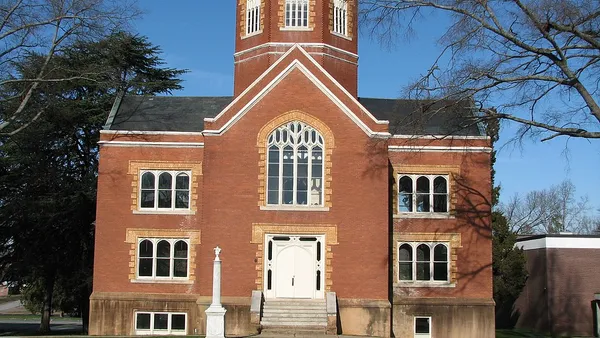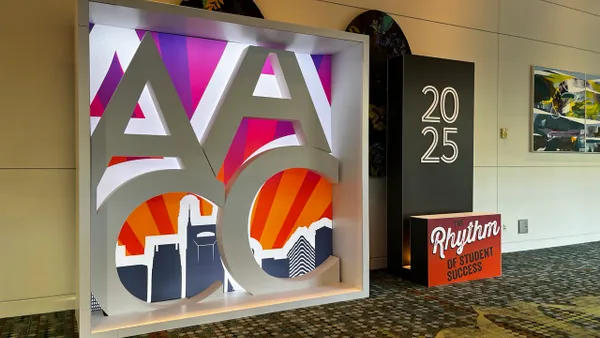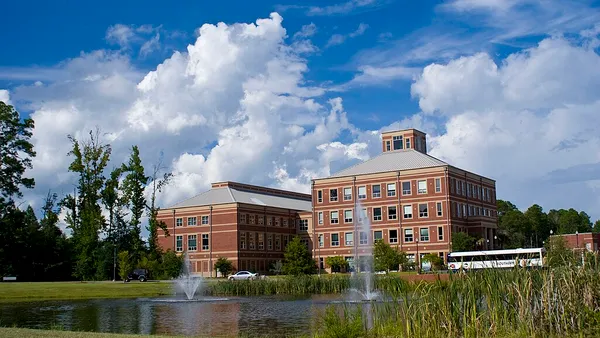Dive Brief:
- State and local appropriations for colleges rose for the ninth year in a row in fiscal 2021, in part because federal coronavirus relief money cushioned government budgets, according to a State Higher Education Executive Officers Association annual report released Tuesday.
- Funding per full-time-equivalent student increased by 4.5% after adjusting for inflation. This amounted to more than $113 billion in local and state postsecondary education support nationwide, nearly $4 billion of which was federal coronavirus aid, SHEEO found. State funding, however, has still not entirely recovered to heights seen before recessions in 2001 and 2008 on a per-student basis.
- FTE student enrollment at public institutions dropped by 3%, or about 324,000 students, according to SHEEO. Tuition revenue fell similarly, suggesting continued financial turmoil for the sector, which faces a future without the pandemic relief funding.
Dive Insight:
State funding for higher education increasing during the pandemic defies trends observed during past periods of economic turmoil. But enrollment at public institutions has also tended to increase after recessions, making the short recession of 2020 at the beginning of the pandemic unusual in multiple ways.
State funding per FTE jumped in 40 states and Washington, D.C., from fiscal 2020 to 2021. The 4.5% nationwide increase in appropriations was the largest single-year jump since 2014, according to SHEEO.
The influx of federal aid heavily contributed to state funding patterns, SHEEO said. It first helped eliminate the need for state officials to redirect money away from higher education and into other budget areas during the economic crunch of the pandemic. And federal money directly helped bolster appropriations earmarked for colleges’ operations.
Without federal coronavirus aid, funding per FTE would have only risen 2%, according to SHEEO. If states didn't steer the aid toward higher ed and if FTE enrollment hadn't declined, appropriations per student would have fallen 1%.
The report’s authors warn that while the federal support helps, it “cannot be a replacement for long-term state investments as stimulus funds are time-limited and often restricted in their use.”
The extra federal funding also does not remedy other headwinds the sector faces.
Net tuition and fee revenue did not keep up with inflation, primarily because of anemic growth in tuition rates. The continued tuition revenue decline will pressure states not to cut public higher ed funding in coming years, but some will likely do so anyway as federal aid dries up, SHEEO said.
Colleges are increasingly relying on net tuition and fee revenue in their budgets. Net tuition revenue comprised nearly 21% of revenue in 1980 compared to about 42% in 2021.
State financial aid is also increasing, SHEEO said. State financial aid per FTE rose by almost 9% from 2020 to 2021, and it increased nearly 40% since 2008. In all, 31 states increased financial aid from 2020 to 2021.
Meanwhile, some states are still experiencing the financial sting of past economic recessions, the organization said.
State higher education funding in 21 states has recovered to levels seen prior to the 2008 Great Recession. But appropriations in nine states remain at least 20% below 2008 levels when adjusted for inflation, the organization said.The three states with the largest declines from 2008 to 2021 were Oklahoma, where funding fell more than 42%, Nevada, which decreased by 39%, and Louisiana, with a 37% drop.
Public institutions on the whole are uncertain about future revenues, but state support is key for their success, the SHEEO report said.
“Now is a crucial time to make long-term, sustained investments to promote educational quality and student affordability and to reduce inequality in educational attainment,” the authors wrote.














